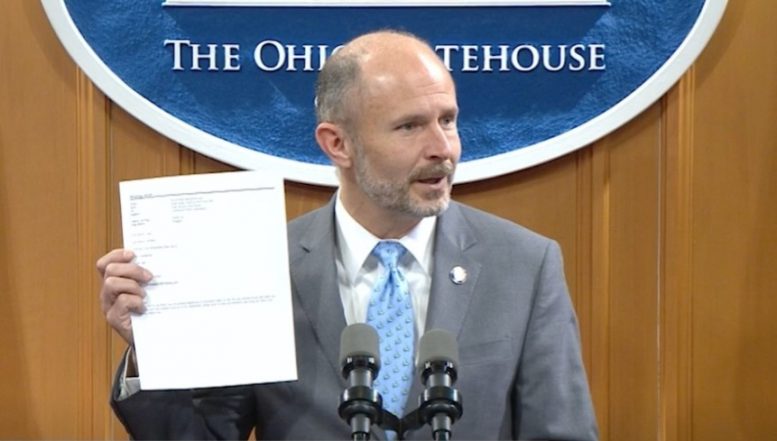Senate Republicans are pushing a constitutional change to make it significantly harder to raise income tax rates, which are at their lowest points since Ronald Reagan was president.
The Senate Ways and Means Committee held its first hearing on Senate Joint Resolution 3 on Tuesday, which would require a supermajority vote in both the state House (66 votes of 99 members) and Senate (22 votes of 33 members) to raise Ohio’s income tax rates. (State Senator Theresa Gavarone, R-Bowling Green, is a cosponsor of the bill.)
Should the General Assembly pass the legislation, which would itself require supermajority votes in both chambers, the proposal would appear on the 2020 ballot for voters to ultimately decide.
“I think it’s a reasonable request to ask the voters if they feel that increasing the individual income tax rates should have a higher threshold,” said Sen. Dave Burke, R-Marysville, the bill’s lead sponsor, addressing the committee Tuesday.
Currently, a simple majority is required to change income tax rates in either direction. Supermajority votes are required to pass emergency bills and congressional redistricting bills.
If approved by voters on the 2020 ballot, the legislation would require supermajority votes in the general assembly to hike income tax rates, but simple majority votes to lower them.
Several caucus leaders signed on to the legislation, including Senate President Larry Obhof, Senate Ways and Means Chairwoman Kristina Roegner and Senate Judiciary Chairman John Eklund.
Speaking to reporters after the hearing, Burke said should the economy turn sour down the line, the new constitutional language would steer lawmakers to cut spending before eyeing people’s income.
“Should things turn the other direction, and someday they probably will, turning around and taking money back from hard working Ohioans should have a higher bar, and shouldn’t be easy,” he said. “Making tough choices on spending should come first.”
During the hearing, Democratic Sen. Vernon Sykes indicated some skepticism.
“Do you think this could hamper or cause a problem with our bond rating? Or our ability to raise money when and if we really needed to raise additional funds?” he asked.
Burke said he didn’t believe it would, given the state’s options to raise revenue elsewhere or cut spending. However, he said he has not spoken to the credit agencies as to whether the constitutional change might affect Ohio’s credit ratings.
In an interview after the hearing, Sykes said he appreciated the “spirit of the proposal” and that any tax increase should be thoroughly deliberated. However, he said he’d need to hear from the ratings agencies first.
“I’d have stronger support for it if it wasn’t a problem with the bond rating agencies,” he said.
Ohio’s income tax rates have steadily declined since 2005. According to the Ohio Department of Taxation, income tax rates in 2018 hit their lowest levels since 1982.
The highest tier tax rate (annual incomes above $200,000 in 2005 or above $217,000 in 2019) dropped from 7.185% in 2005 to 4.797% in 2019, in addition to a flat fee.
Similarly, marginal rates for a person earning $35,000 annually dropped from 4.27% in 2005 to 2.85% in 2019.
People who earn less than about $21,750 per year do not pay state income taxes.
As the General Assembly slashed income tax rates, however, the body has hiked taxes on gas (most recently in 2018) and cigarettes (most recently in 2015).

